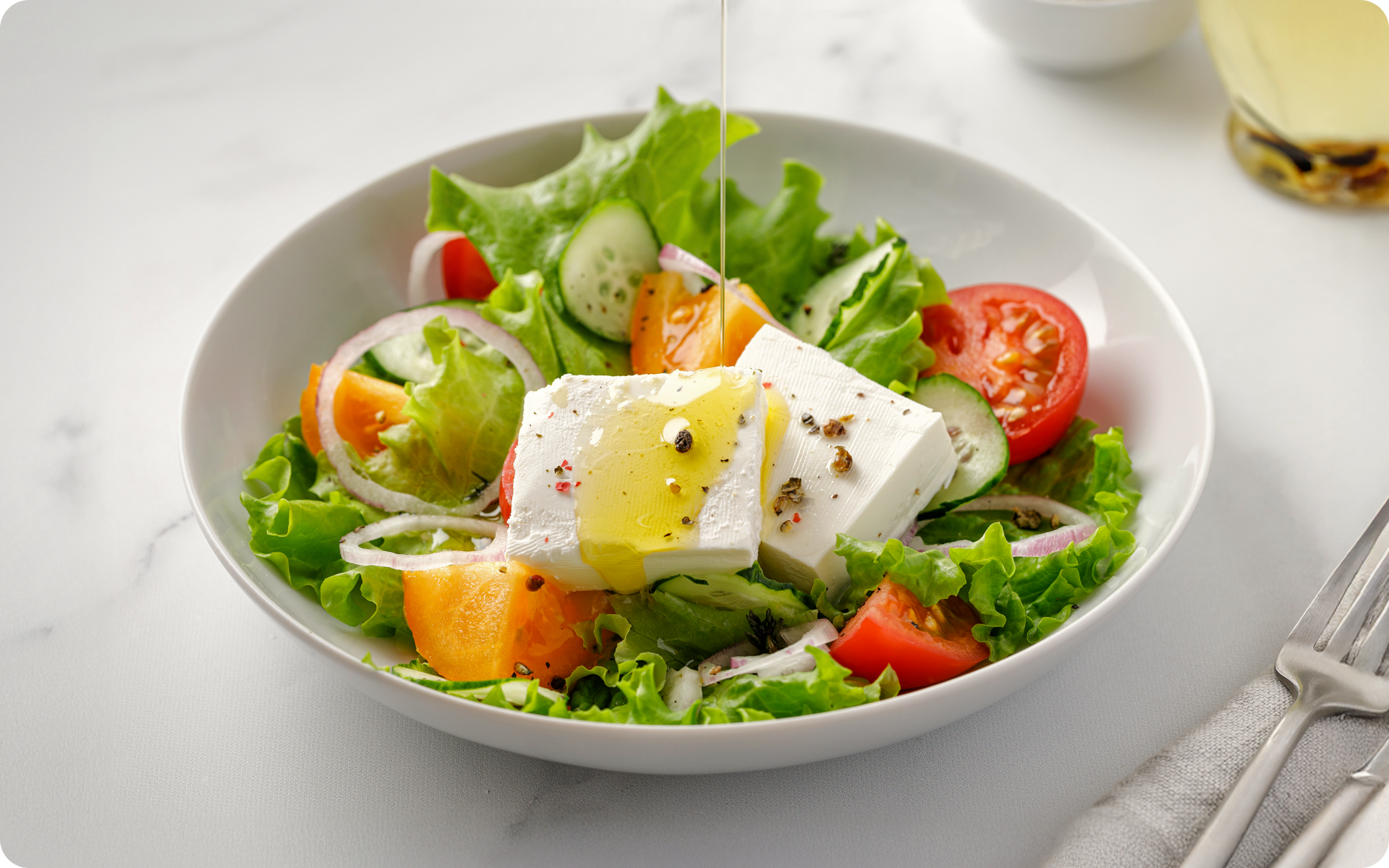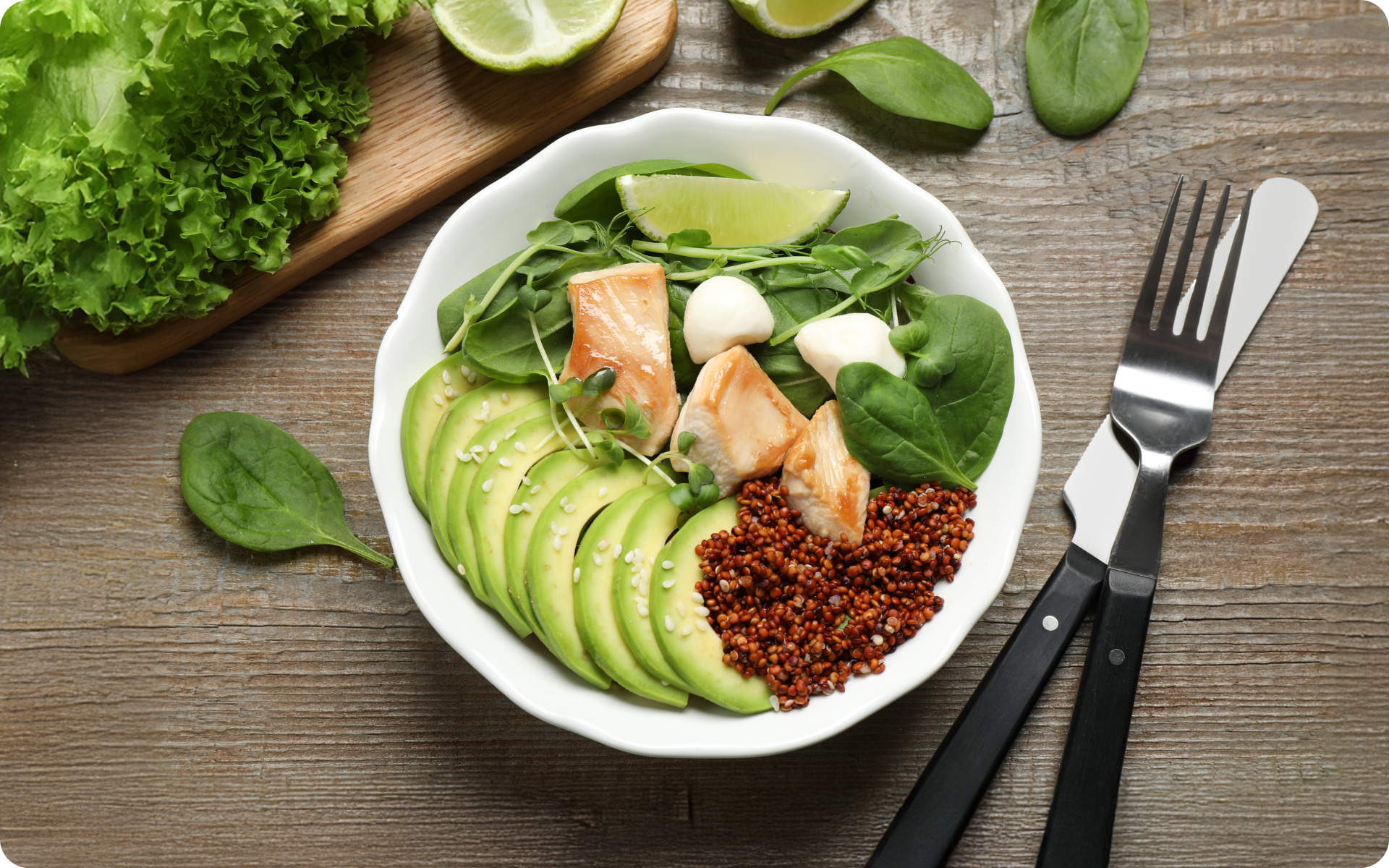Research on high protein intakes suggests that consuming more than the recommended daily protein intake may enhance weight loss through increased satiety, increased thermogenesis, and the preservation of fat-free mass, and may also prevent weight regain after weight loss (1).
On the other hand, studies on the Mediterranean diet suggest that not only can this meal plan help control waist circumference and obesity, but it also emphasizes food that has anti-inflammatory and antioxidant properties, making the Mediterranean diet incredible for:
- Your immunity
- Prevention of cardiovascular diseases, metabolic diseases, and cancer (2).
A high protein Mediterranean diet combines these two meal plans and thus may help with weight loss and better overall health. Read on to learn all you need to know about how to follow a high protein Mediterranean diet effectively.
What Is An Easy To Make High Protein Mediterranean Diet Meal Plan?
You can achieve an easy high protein Mediterranean diet meal by focusing on the consumption of plant-based and lean animal proteins, as well as fatty fish and other seafood, while also incorporating whole grains, a generous intake of a variety of fruits, dark leafy greens, and other vegetables, as well as healthy fats like avocados and olive oil.
What Are The Pillars Of The Mediterranean Diet?
The pillars/key principles of the Mediterranean Diet (MedDiet) are as follows (3):
- A high consumption of plant-based foods, namely fruits, vegetables, whole grains, legumes, nuts, and seeds.
- The use of virgin or extra-virgin olive oil as the main source of fat. Use it as a seasoning and to cook food.
- A moderate consumption of dairy products (mainly cheese and yogurt), fish, and poultry, and a restricted red meat intake.
These pillars come from the traditional MedDiet, where those who followed it not only consumed a plant-based diet, but they also believed in consuming the following (4, 5):
- Fresh, seasonal, locally grown, and minimally processed fruit and vegetables
- Traditionally minimally refined whole grains
- Fruits are the typical dessert, allowing sweets made with honey or sugar a few times a week.
- Olive oil is the primary source of fat
- Legumes several times weekly
- A relatively high intake of nuts and seeds – either as part of the recipes or as healthy snacks – regularly
- Herbs and spices as flavorings for foods and recipes
If you wish to free yourself from all the extra pounds that have been weighing you down for way too long, start using the BetterMe: Health Coaching app and overhaul your entire life!
The diet also advocated for a high water intake. Aside from the above, the traditional MedDiet also limited the consumption of the following (4, 5):
- Dairy products (milk, cheese, and yogurt), fish, and poultry were allowed, but only in moderate intakes. Dairy is allowed several times a week in limited amounts.
- Fish and poultry are allowed 2-3 times weekly.
- Eggs are allowed, but they have a maximum weekly limit of 4 times.
- Red meat occasionally in small amounts.
- Red wine was allowed in moderation, typically with meals.
Read more: The Benefits of Not Drinking Soda or Why This Sugary Beverage Is Worth Quitting
Does Mediterranean Diet Lack Protein?
No, it does not. Because red meat is largely discouraged, and other animal proteins are allowed in moderation in the MedDiet, one may think they will not reach their protein macros while on this diet; however, this belief could not be further from the truth.
What Are The Mediterranean Style Proteins?
The primary Mediterranean diet protein sources are plant-based options like nuts, legumes, lentils, and whole grains.
Plant-based sources aside, you can also consume lean chicken and turkey, eggs, fatty fish, other seafood, and dairy products such as cottage cheese to add to your protein intake.
While you must practice moderation, it does not remove the fact that these foods still make up the MedDiet and are lean and healthy protein sources.
This review shows that while a high protein Mediterranean diet may have less animal protein than a typical Western diet, it does not lack protein.
Note that:
If you are disappointed in the lack of or somewhat limited intake of red meat in this diet, remember that research and experts suggest that too much red meat increases your risk of cardiovascular disease and may also increase the risk of diabetes and certain cancers (6, 7, 8). A high protein MedDiet may save your heart and overall health.
How To Eat A High Protein On A Mediterranean Diet
The best way to eat a high protein Mediterranean diet is to:
- Follow The Mediterranean Diet Protein Guidelines
As shown above, this is a primarily plant-based diet that allows lean animal proteins and fish in moderation and significantly limits the intake of red meat.
Suppose you are planning to go grocery shopping for high protein Mediterranean meal prep, you will need the answers to these questions:
- Which proteins should I buy in large quantities?
- Which protein should I purchase in moderate amounts?
- Which protein should I limit or avoid?
This understanding helps you stay true to the meal plan, but also goes a long way in avoiding food waste.
As we stated above, as you grocery shop or meal prep, ensure that:
- The bulk of your proteins comes from plant-based sources: Examples are lentils, chickpeas, all types of beans, soy products like tofu and edamame, as well as nuts and seeds
- Fatty fish, seafood, and poultry: These are allowed in moderate amounts, around 3 times a week, so shop with this in mind. Salmon, mackerel, sardines, anchovies, herring, crab, oysters, lobster, as well as chicken, duck, and turkey, are fantastic options for this section.
- Eggs: You can have these around 4 times a week so shop and prep accordingly.
- Dairy Products: Allowed several times a week, but in moderate amounts. Greek yogurt, cottage cheese, Parmesan, cheddar, mozzarella, low-fat milk, and kefir are great examples. Whey protein is great for a high protein meal plan, but since dairy consumption is limited, you can replace it with plant-based protein powder.
Check out this article on the Mediterranean diet food list to see what other foods, herbs, and spices you should shop for to better follow this meal plan.
The BetterMe: Health Coaching app will provide you with a host of fat-frying fitness routines that’ll scare the extra pounds away and turn your body into a masterpiece! Get your life moving in the right direction with BetterMe!
- Watch Your Macros
The regular Mediterranean diet macros (9) are not necessarily tailored for a high protein Mediterranean diet. When following a meal plan that’s higher in this macronutrient, you might be increasing your protein intake to up to around 1.5 g per kilogram of body weight per day (10). Use this formula to approximate how much protein you should eat daily.
Read more: Clean Eating Challenge: A Simple Guide To Kickstart Your Journey
What Is A Sample Of A High Protein Mediterranean Diet Meal Plan?
If you are unsure where to start with this diet, here are some meal options to help you get started.
High Protein Mediterranean Diet Breakfast Options
- Oats with soy milk, berries, and ground chia seeds
- Whole grain avocado toast with tempeh, tomatoes, and microgreens
- Pineapple, banana, and spinach smoothie with chia seeds and a scoop of protein powder (whey or plant protein)
- Egg white omelet with seasonal veggies and a side of fruit
- Blueberry Greek yogurt parfait with granola
High Protein Mediterranean Diet Lunch & Dinner Options
- Kimchi tofu stew with steamed/boiled brown rice
- Oven-baked lemony salmon with asparagus and roasted sweet potato
- Quinoa salad bowl with lettuce, chickpeas, cherry tomatoes, red onion, feta cheese, and olives
- Slow-cooked chicken with couscous and roasted Brussels sprouts
- Whole grain pasta with turkey meatballs
If you hope to maintain or lose weight, these meals are great options on your weekly menu, but the options are endless, and you can customize them to your preferences.
Make sure to stay within the recommended calorie intake for your goals.
- If weight loss is your main goal with this diet, check out our article on the Mediterranean diet intermittent fasting meal plan to learn how to leverage intermittent fasting for successful weight loss.
What Is Not Allowed On The Mediterranean Diet?
This diet limits the consumption of ultra processed foods, refined grains, red meats, and foods high in salts and added sugars.
A typical MedDiet breakfast may include whole grain bread, some fruit, as well as a source of lean protein and/or healthy fats, like eggs, nut butter, or yogurt. Yes, they are. As previously mentioned, this meal plan places a heavy emphasis on the consumption of fruits and vegetables. Experts highly recommend bananas and other fruits on the MedDiet. This diet calls for a moderate consumption of eggs and allows up to around 4 eggs per week. This may then translate to one egg every other day, or two eggs twice a week. Potatoes are starchy vegetables, which are allowed on this eating plan. They are a good source of complex carbohydrates, potassium, and fiber.Frequently Asked Questions
What is a typical Mediterranean breakfast?
Are bananas ok on the Mediterranean diet?
How many eggs a day on a Mediterranean diet?
Are potatoes ok on a Mediterranean diet?
The Bottom Line
A high protein Mediterranean diet is a combination of the Mediterranean and high protein diets, and it can help you maintain/lose weight and boost your overall health if followed correctly. If you’ve been wondering how to combine these two diets for health and weight benefits, we hope this article has shed light on how you can effectively do this. Remember to watch your calorie intake if you’re aiming for weight loss and track your macros if you have specific goals.
DISCLAIMER:
This article is intended for general informational purposes only and does not serve to address individual circumstances. It is not a substitute for professional advice or help and should not be relied on for making any kind of decision-making. Any action taken as a direct or indirect result of the information in this article is entirely at your own risk and is your sole responsibility.
BetterMe, its content staff, and its medical advisors accept no responsibility for inaccuracies, errors, misstatements, inconsistencies, or omissions and specifically disclaim any liability, loss or risk, personal, professional or otherwise, which may be incurred as a consequence, directly or indirectly, of the use and/or application of any content.
You should always seek the advice of your physician or other qualified health provider with any questions you may have regarding a medical condition or your specific situation. Never disregard professional medical advice or delay seeking it because of BetterMe content. If you suspect or think you may have a medical emergency, call your doctor.
SOURCES:
- Clinical Evidence and Mechanisms of High-Protein Diet-Induced Weight Loss (2020, pmc.ncbi.nlm.nih.gov)
- The Mediterranean Diet: An Update of the Clinical Trials (2022, pmc.ncbi.nlm.nih.gov)
- Knowledge, attitudes, and use of the Mediterranean diet in practice among dietitians in the United Arab Emirates: a cross-sectional study (2025, nature.com)
- Impact of Mediterranean Diet on Chronic Non-Communicable Diseases and Longevity (2021, mdpi.com)
- The Mediterranean diet and health: a comprehensive overview (2021, onlinelibrary.wiley.com)
- Eating red meat daily triples heart disease-related chemical (2019, nih.gov)
- Study strengthens links between red meat and heart disease (2021, escardio.org)
- Red meat consumption, cardiovascular diseases, and diabetes: a systematic review and meta-analysis (2023, pubmed.ncbi.nlm.nih.gov)
- Macronutrient Adequacy of a Mediterranean-type Meal Examined at Recommended and Below Recommended Energy Values (2024, pmc.ncbi.nlm.nih.gov)
- High Protein Diet (n.d., sciencedirect.com)














